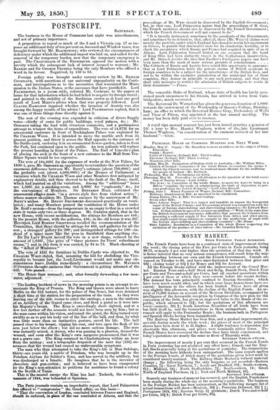The Paris journals contain an improbable report, that Lord Palmerston
has offered to " compromise " the Greek affair, on this basis-
" That the convention of London, concluded between France and England, should be enforced, in place of the one concluded at Athens, and that the proceedings of Mr. Wyse should be disavowed by the English Government ; but, in that case, Lord Palmerston insists that the proceedings of M. Gros, the French mediator, should also be disavowed by the French Government ; which the French Government will not consent to do."
" It is broadly insinuated, sometimes by the assailants of tho Government, and sometimes by its defenders, that, after all, these [Mr. Wyse's] claims were merely the pretexts under which England has chosen to wreak her resentment on Greece, to punish that diminutive state for its clandestine hostility, or to check the ascendancy which Russia and France had acquired in spite of us at Athens. Lord Palmerston himself hinted on one occasion that the hand of King Otho had been distinctly traced in the Cephalonian insurrection, and Mr. Disraeli derides the idea that Pacifico's Portuguese papers can have
been more than the mask of more serious grounds of remonstrance The Cabinets of Russia and Austria have seized this opportunity to announce that as Lord Palmerston holds the private claims of British residents in foreign countries to be a subject for the interference of the British fleet, and not to be within the exclusive jurisdiction of the municipal law of those countries, they demur in principle to any such pretension, and that they shall take measures to restrict the admission of British subjects to reside in their dominions."—Times.


























 Previous page
Previous page